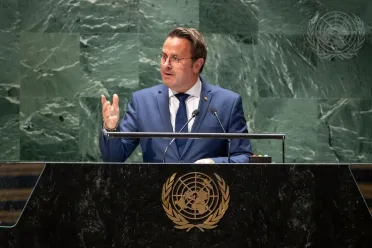Statement
Statement summary
XAVIER BETTEL, Prime Minister of Luxembourg, stressing that States must act together as “truly united nations”, said: “I have an impression that everyone has their own definition of what it means to be united.” First, it means to be able to count on each other, he observed, pointing out that Luxembourg, as a small country, has always believed that a union with other States makes it greater and stronger. As a founder of the North Atlantic Treaty Organization (NATO), OECD and the Council of Europe, it wants to strengthen multilateralism by building bridges. Pointing out that the pandemic and the war in Ukraine have led to worsening of poverty indicators, he recalled that, for years, his country has allocated 1 per cent of its gross national income to official development assistance (ODA) for least developed countries. He also observed that in many European countries, when Governments come to power, one of the first budgets they cut is that on cooperation, because of their domestic problems, adding: “We do not realize that the problems we have at home are ‘luxury problems’ […]. The problems they [other countries] have are the question of survival.”
He went on to say that the High-level Dialogue on Financing for Development — prepared by Luxembourg and South Africa — allowed Member States to identify ways for bridging funding gaps for the Sustaianble Development Goals and mobilizing resources for developing countries to tackle debt. On climate change, he said that tornadoes and floods, which used to happen in other parts of the world, are now happening “at home”. “Can you imagine coming from a country that risks disappearing because ice caps are melting?” he asked, encouraging those present to think about how they could change this. In this context, his Government has increased its Green Climate Fund by 25 per cent for 2024-2027, while Luxembourg Green Exchange has emitted its first green bonds and mobilized private capital. Underscoring the importance of public-private partnerships, he stated: “You are welcome to visit Luxembourg to see the different options to bring the public and the private [sectors] together.”
Expressing regret that, in 2023, human, civil and economic rights differ for people depending on their place of birth, gender and orientation, he lamented: “We are not united when we speak about human rights.” For Luxembourg, defending human rights of women and children will remain a priority, he underscored, also calling on those present to be “intolerant to intolerance”. He also noted that “being gay is not a choice, but being homophobic is [a choice]”, pointing out that he had to confront people who do not accept diversity. Recalling that he is one of the few leaders who had calls with Ukraine President Volodymir Zelenskyy and Russian Federation President Vladimir V. Putin, he said he was criticized for it, adding: “But I don’t regret it. If we want to find solutions, we need to speak to one and to the other.” Noting that he grew up in peace, he emphasized: “If I am free in front of you, it is because other countries supported Luxembourg.” Countries will truly be “united nations” if they provide their citizens with the same rights to live, to be educated and to be as they are, and not like other people would like them to be, he emphasized.
Full statement
Read the full statement, in PDF format.
Photo

Previous sessions
Access the statements from previous sessions.
